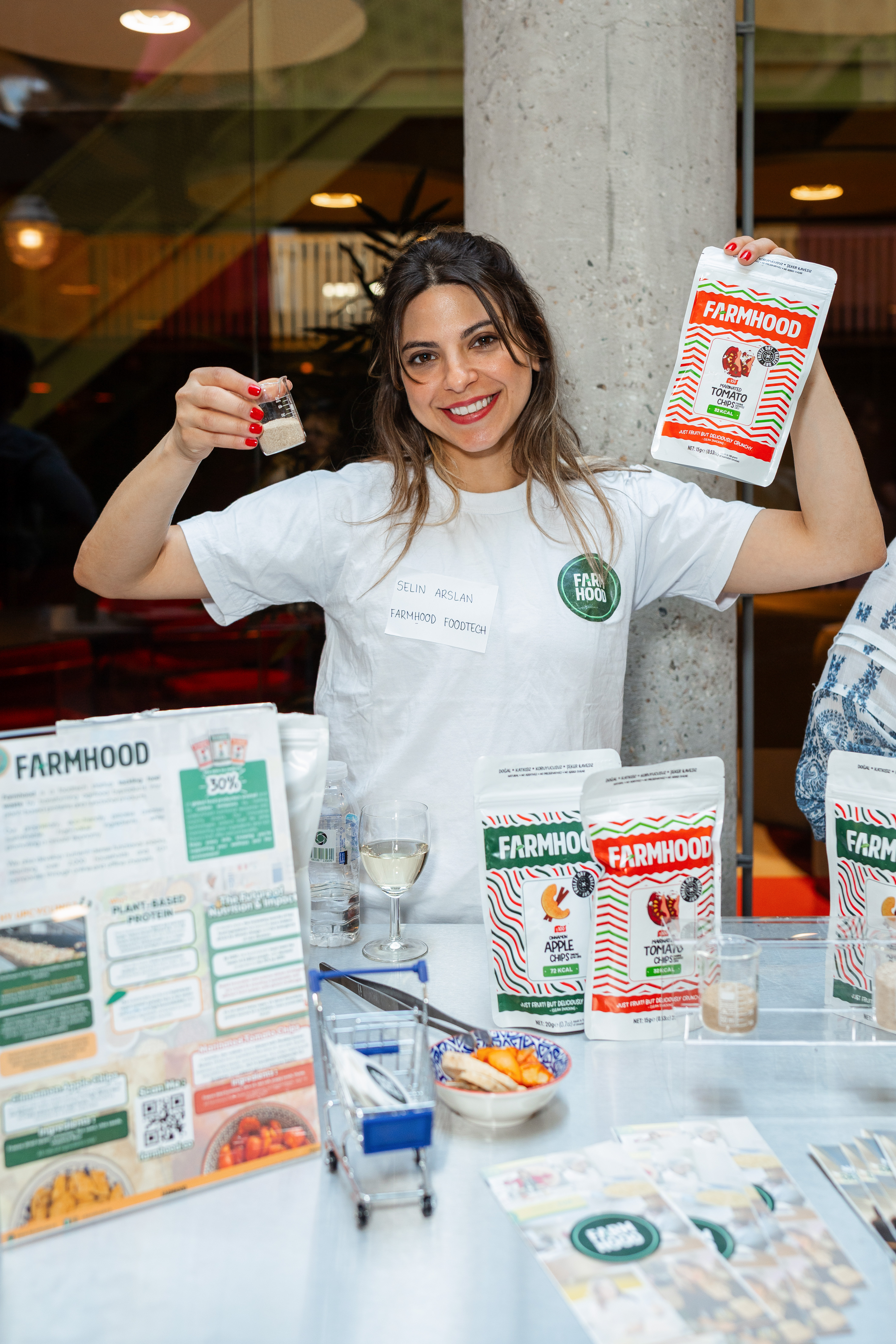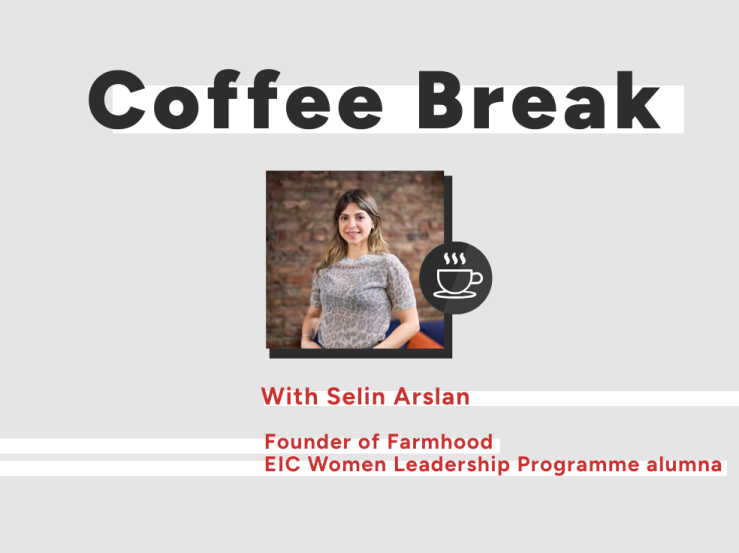Every month, during a Coffee Break, we dive into the stories of EIC innovators and get a glimpse of the people behind EIC projects. Today’s guest is Selin Arslan, alumna of the EIC Women Leadership Programme and founder of Farmhood – Istanbul-based food-tech startup on a mission to valorise food waste and reduce carbon emissions. From Selin’s words, what emerges is an entrepreneurial path rich in learnings which she confidently shares, towards the end of the interview, with aspiring female founders. Tune in and get inspired from her transformative journey, recently culminating with the winning of the EIC Women Leadership Programme Pitching Spotlight!
Starting from your background, what inspired you to start Farmhood, and was there a key moment that turned the idea into action?
My background is in industrial engineering and supply chain consultancy, where I worked closely with global companies in fast-moving industries. But the inspiration stemmed from a personal frustration with the inefficiencies of our food system: it was seeing valuable food by-products go to waste, that planted the first seed.
The key turning point came during the pandemic, when I returned to my hometown and saw small producers struggling while nutritious agricultural produce waste was piling up. That contrast led me to launch Farmhood, starting with nothing other than the belief that we could do better – both for our health and the planet – by upcycling overlooked plant materials into nutritious, functional food ingredients.
Your solution sits at the intersection of green tech and food systems. Can you walk us through the core innovation behind Farmhood and how it fosters sustainability in the food system?
Farmhood’s core innovation lies in transforming nutrient-rich food industry by-products like oilseed press cakes – the by-product left after cold-pressing vegetable oils – into high-quality plant protein. Unlike traditional methods, our proprietary extraction method is solvent-free and energy-efficient, making the process scalable and sustainable.
We are building a circular food system where sidestreams, left over by food businesses during the production process, become valuable inputs rather than waste, reducing both food loss and the carbon footprint of plant protein production.
Beyond technology, we also work directly with food companies to close the loop on supply chains and co-create clean-label ingredients and products.

© Farmhood
You have participated in the EIC Women Leadership Programme’s (WLP) 8th cohort. How has the programme changed your entrepreneurial path and leadership approach?
The EIC Women Leadership Programme (WLP) came at a transformative moment for me. As a female founder navigating both science and business, I often wore too many hats.
Not only did the programme give me access to a powerful network of mentors and peers; it also helped me refine my leadership style, learning when to take the lead and – on the contrary – when to delegate or listen.
The programme encouraged me to think more strategically about growth, investment, and team building, while staying grounded in my values as a purpose-driven founder. The mentorship pool consists of amazing female founders! I feel more encouraged to take bolder steps seeing their accomplishments.
Congratulations on winning the EIC Women Leadership Programme Pitching Spotlight! Can you tell us what this achievement means to you and FARMHOOD at this stage of your journey?
Thank you! Winning the EIC WLP Pitching Spotlight felt like validation not just of our idea, but of the grit and resilience it took to get there without external investment.
For Farmhood, it’s a sign that our technology and impact are resonating with other people now, and that we are ready to scale. For me personally, it’s a confidence boost and a reminder that deep tech food innovation can come from lean, agile teams and exceed expectations on the European stage.
During the EIC WLP Pitching Spotlight, you joined seven other WLP alumni to pitch to a panel of investors. What were some of the biggest challenges you faced while preparing for the pitch, and what are your main takeaways from this experience?
The biggest challenge was distilling all these different details about Farmhood and our mission-driven strategy into a compelling 4-minute story. We wanted to showcase our traction and scientific backbone without overwhelming the audience. Working with WLP mentors helped us achieve that balance.
I believe the main lesson would be understanding that clarity pays off, thus it is very important to have a clear explanation. Our pitch used to be more overwhelming, trying to say everything about us, but now I understand investors connect with clear value propositions, measurable progress, and founders who know their path – even if the journey is just beginning.
It also reminded me how powerful founder storytelling can be when rooted in authenticity.
To conclude the interview, as a female founder, what advice would you give to other women looking to lead in your sector?
Start before you feel ready because you probably already are. Don’t wait for perfect timing or funding to validate your idea. Instead, prove its worth by starting small, learning fast, and showing results. Especially in deep tech and food systems, impact takes time, but momentum comes from taking consistent, bold steps.
And finally, build your support system early. Leadership doesn’t mean doing it alone; it means knowing when to ask for help and surrounding yourself with those who believe in your vision.
EIC Women Leadership Programme Pitching Spotlight – meet the other founders!
Julia Minici, Co-Founder, Chairperson & CPO - Afterwind:
recycling end-of-life composites from wind energy, construction and mobility into traceable virgin-grade materials.
Sorina Uleia, Co-Founder & CEO - Recycllux srl:
developing a deep-tech platform to fight marine plastic pollution in a transparent, data-driven and scalable way.
Harshni Selvaraj, CCO - Solmeyea:
producing carbon-negative functional food ingredients as an alternative to animal-based and plant-based proteins.
Fanni Giannou, Founder & CEO - Alithea Biotechniology GmbH:
revolutionising cancer treatment with end-to-end solutions, transforming patient samples into personalised therapies.
Anthea Wirges, Co-founder and CEO - CARTemis Therapeutics GmbH:
unlocking the curative potential of CAR-T cells for hematologic malignancies and autoimmune diseases.
Valentina Garonzi, CEO - Diamante Società Benefit srl:
developing a new class of immunotherapies for autoimmune diseases, using an innovative plant-based biomanufacturing platform.
Silvia Scaglione, Founder and Chief Scientist - React4Life:
producing organ-on-chip platforms, designed to overcome the limitations of traditional in vitro assays and animal models.
Additional information about Farmhood
Based at Nişantaşı University (Istanbul, Turkey), Farmhood is dedicated to transforming underutilised plant-based materials into value added snacks and food ingredients via green technologies. Founded by Selin Arslan, who participated in the EIC Women Leadership Programme (WLP) 8th cohort as female founder backed by the European Institute of Innovation and Technology EIT - based on the partnership between EIC WLP and EIT), the food-tech company builds on its team’s 25 years’ expertise in food engineering, biotechnology, business strategy and marketing.
Find out more about Farmhood by visiting the company’s website.
Additional information about the EIC Women Leadership Programme
Supporting women innovators is integral to the EIC's strategic goals for 2021-2027, aimed at enhancing Europe’s economic competitiveness. The EIC has allocated significant resources to women-led companies, demonstrating a commitment to closing the gender gap in research and business. Initiatives like the EIC Women Leadership Programme and Women TechEU are crucial in driving deep tech innovation and empowering women across Europe.
If you have any questions, please contact us through the EIC Community’s contact page by choosing the 'EIC Women Leadership Programme' category, or visit the Frequently Asked Questions (FAQ).

DISCLAIMER: This information is provided in the interest of knowledge sharing and should not be interpreted as the official view of the European Commission, or any other organisation.

